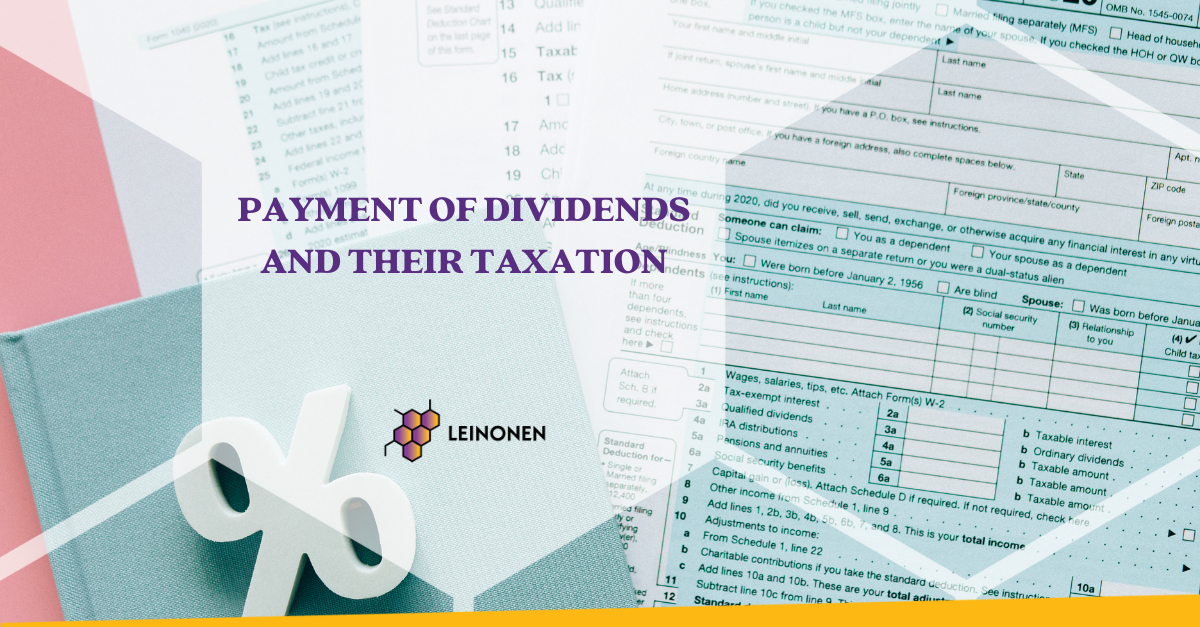THE PROCESS OF DIVIDEND PAYMENT
A dividend is an instrument of how the company distributes the profits to its shareholders. For a shareholder (business owner) the dividends are the ultimate right towards the company. Therefore, only the shareholder is entitled to decide on the payment of dividends.
Normally, dividends shall be paid out to a shareholder in proportion to the sum of the nominal values of the shares owned by him or her (10 % of the shares are entitled to 10% of the distributable profits). However, the articles of association of a company can provide for different provisions (for instance, applying different coefficients to different classes of shares etc.).
The process of decision-making as of payment of dividends is as follows. The board of the company convenes the ordinary shareholder’s meeting proposing to approve the annual statement of the company and to decide on profit distribution. The board of the company shall ensure that the shareholders have access to the proposal. Commercial Law lists the items which shall be included in the proposal. After the shareholder’s meeting is held and the minutes of the shareholder’s meeting are signed, there is a legal ground for payment of dividends to the shareholders of the company.
SPECIAL FEATURES REGARDING DIVIDEND PAYMENTS
In the event the company has undistributed profits, shareholders have an option, in accordance with the procedures specified in the Commercial Law, to request the board of the company to convene a meeting of shareholders in order to decide on the use of the undistributed profit.
As already mentioned above, the rights of the shareholders to receive dividends from the company can be affected by the articles of association of the company, where several classes of shares are determined, and these classes of shares differ by the amount of dividends to paid for such shares (for instance, class A shares are entitled to dividends with a coefficient of 1.2, class B shares – 1.0, but class C shares – 0.8 etc.).
Joint-Stock companies in accordance with the Commercial Law have an option to issue special type of shares (stocks) – preferred stocks. Preferred stocks can give special rights to a stockholder in relation to the receipt of dividends (for instance, guaranteed certain sum of money as dividends each year).
Commercial Law also provides for a possibility to pay out extraordinary dividends. Such an option shall be stipulated in the articles of association of the company – that dividends may be determined and calculated also from the profit acquired during the period after the end of the previous reporting year.
A prerequisite for the payment of extraordinary dividends is that the board of the company shall draw up and submit to the meeting of shareholders a report on economic activity of the company for the period for which extraordinary dividends are determined and a proposal for the part of the profit to be paid out in extraordinary dividends. The meeting of shareholders cannot determine a greater part of profit to be paid out in extraordinary dividends than that determined in the proposal. The report on the economic activity of the company shall comply with the requirements on drawing up the annual statement, and the board of the company shall ensure that shareholders have access to the report and the proposal.
The board shall not convene a meeting of shareholders if the company has no profit in accordance with the report on economic activity which has been drawn up for the extraordinary dividend payment period. There are other preconditions which shall be met on the day of taking the decision of the meeting of shareholders in order to pay out the extraordinary dividends:
- the company has no tax debts;
- the company has no tax payments deferred or divided in periods, and the advance tax payments to be made by the company have not been reduced.
There are also certain time limits set by Commercial Law for adopting a decision on payment of extraordinary dividends. Namely, the meeting of shareholders shall take the decision to determine extraordinary dividends:
- not earlier than three months after the previous decision of the meeting of shareholders to determine dividends has been taken;
- not later than three months after the end of the reporting period on which the report on economic activity of the company has been drawn up.
This means that, if there is a wish to pay out extraordinary dividends for first three months (first quarter) of the financial year (January – March) and the report has been made on the 10th of April, shareholder’s meeting shall adopt the decision on the payment of extraordinary dividends for the first quarter not later than on 10th July.
Payment of extraordinary dividends also put some additional liability on the board of the company, since the board in the meeting of shareholders shall certify that:
- the financial situation of the company has not significantly deteriorated until the day of the meeting of shareholders;
- paying out of extraordinary dividends does not pose a risk to the fulfilment of the commitments of the company in the remaining months of the reporting year.
GENERAL RESTRICTIONS
Dividends is allowed to be calculated and paid out only for fully paid shares.
Shareholder is not entitled to receive dividends from the company in case the shareholder has not provided information to the company about the ultimate beneficial owner of the shares in question in accordance with the KYC/AML laws in force.
Dividends may not be determined, calculated and paid out if it arises from the annual statement or from the report on economic activity that the own funds of the company are less than the equity capital.
Dividends shall be paid out only in cash (money) – it is not possible to pay out dividends substituting money with some tangible or intangible property.
Dividends which have not been taken out within 10 years will be transferred back into the ownership of the company, except when, pursuant to the law, the limitation period is deemed to be discontinued or suspended.
The decision of the shareholders of the company that the dividends, even temporarily, are to be left at the disposal of the company will be void and not executable. The company may also not request a shareholder to return the dividends received, except the cases where apparent mistakes were made or it turns out that the shareholder was not legally entitled to the dividends paid.
If the equity capital of the limited liability company is less than EUR 2800, the company may pay out in dividends the share of the profits of the reporting year that remains after deductions in the mandatory reserve.
TAXATION OF DIVIDENDS
In Latvia, taxation of corporate profits is postponed until those profits are distributed as dividends or deemed to be distributed. Distributed profits are subject to 20% Company Income Tax (CIT).[1] If 20% CIT from the profits of the company has been paid, the dividends paid to shareholders – Latvian residents – are exempt from personal income tax (PIT) and CIT, if the shareholder is a company. The situation of non-residents receiving dividends from a Latvian company depends on their domestic tax law and bilateral treaties concluded with Latvia. Since there is no withholding tax on dividend payments in Latvia, EU rules on the elimination of double taxation of profits of subsidiaries located in other member states are not relevant.
Does your company need any assistance with Latvian taxation regulations? Get in touch with Leinonen’s Latvian Taxation department.
[1] Before applying the statutory rate, the taxable base should be divided by a coefficient of 0.8. As the taxable base is increased by the coefficient, the effective CIT rate is 25%.





